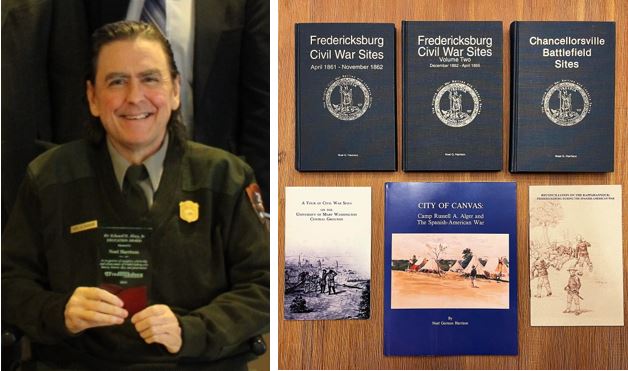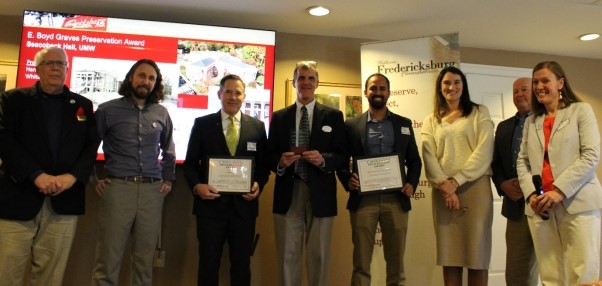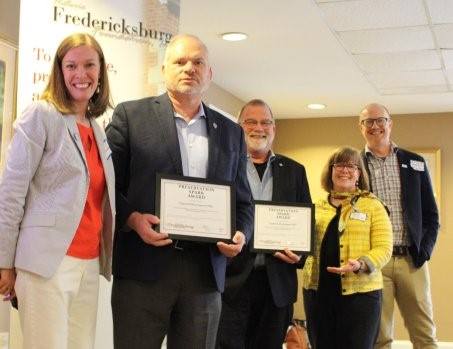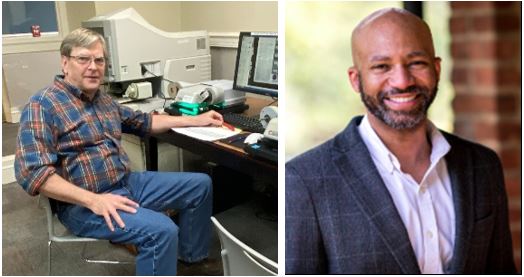HFFI’s 2024 Preservation Award Recipients
The Historic Fredericksburg Foundation, Inc., held its 69th Annual Membership Meeting on Saturday, March 9, recognizing people, businesses, and institutions that have made outstanding contributions to preserving the unique cultural heritage and historic built environment of the Fredericksburg area.
Five recipients of HFFI’s 2024 Preservation Awards were individuals. The first, retired Spotsylvania middle school teacher Mayo Carter, was honored with the Lillian D. Reed Volunteer Award for her support of local history education and efforts to connect the public to the past at HFFI events and throughout the community. This award, given to a dedicated volunteer, is named for one of HFFI’s founders. Lillian Dooley Reed (1903–1998) was an outstanding area preservationist who championed HFFI’s earliest efforts to save and relocate the two-story brick dependency from behind the National Bank, now home to Foode restaurant.
Linda Billard received the President’s Exceptional Service Award this year in recognition of her unflagging support and invaluable editing and writing skills for HFFI’s publications for many years. Ms. Billard is a retired writer/editor, who has supported the production of many HFFI publications, including the 2018 book, Home for the Holidays: Historic Fredericksburg’s Candlelight Tradition.

Two individuals received the President’s Special Recognition Award. The first is historian and author, Dr. Keith Littlefield, who grew up in Fredericksburg and continues to research and publish local history. His most recent book is From New Post to Princess Anne St: The Postal History of Fredericksburg, Virginia 1657–1990. The second recipient of a Special Recognition Award is Michael Way, a project manager with Island Architects in Richmond. Mr. Way was recognized for volunteering his time and expertise to retrieve and reformat measured drawings of the Renwick Courthouse, Wallace Library, and Old Jail. This documentation has already been used to assist the ongoing structural analysis of the tower by REI Engineering and will reduce the cost of any future rehabilitation work at the complex.
The last individual honored at HFFI’s meeting was Noel G. Harrison, recipient of the Dr. Edward D. Alvey, Jr. Education Award. Named in honor of Alvey (1902–1999), a former Dean and Professor of Education at Mary Washington College and past president of HFFI, the award recognizes Harrison’s significant contributions since 1984 toward the advancement of preservation-related education. A cultural resource specialist with the National Park Service at the Fredericksburg and Spotsylvania National Military Park, and specializing since 2007 on the management of Park Service-held conservation easements, Harrison is an exemplary scholar of histories well beyond Fredericksburg and regularly shares his knowledge in regional publications. He has written definitive reference guides to local sites of historical importance to the Civil War, including Fredericksburg Civil War Sites, Volumes I & II (1995); Chancellorsville Battlefield Sites (1990); and A Walking Tour of Civil War Sites on the Campus of Mary Washington College (1993). Harrison was also a regular contributor to the National Park Service’s website, Mysteries & Conundrums: Exploring the Civil War-Era Landscape in the Fredericksburg & Spotsylvania Region and has written articles for HFFI publications. Fellow cultural resource specialist at the National Park Service Eric Mink presented the award on behalf of HFFI, and many local researchers posed for a group photograph to show their appreciation.

The final two HFFI awards recognized the act of preservation through the rehabilitation of historically significant resources in the Fredericksburg. One project was spearheaded by the University of Mary Washington and the other by the Virginia Railway Express.
In the UMW project, the university undertook a historically sensitive rehabilitation project to adaptively reuse the 1931 Seacobeck Hall designed by architect Charles Robinson. The project converted the former dining hall into a mix of “classrooms and lab space with the latest technologies, faculty offices, collaboration and group work rooms, student organization spaces, a large assembly space, a curriculum lab, and makerspace,” according to architects at the Richmond firm Hanbury. Members of Hanbury’s design team and the Whiting-Turner Contracting Company joined Capital Outlay Director, Gary Hobson, of UMW in accepting HFFI’s E. Boyd Graves Preservation Award, presented by Professor Michael Spencer, author of UMW’s Campus Preservation Plan and acting Chair of the Department of Historic Preservation. The E. Boyd Graves Preservation Award is named for one of HFFI’s founding members who played an instrumental role in protecting, preserving, and adaptively reusing some of Fredericksburg’s most recognizable historic landmarks.

HFFI recognized another notable preservation project by the Virgina Railway Express (VRE) to preserve the Fredericksburg train station’s 1927 concrete platform and Sophia, Caroline, and Charles street overpasses. Designed by noted engineer John E. Greiner & Company in 1924, the platform and overpasses are a connected series of form-poured, reinforced-concrete structures that carry the elevated tracks through downtown. VRE’s laudable effort required skillful precision and technologically advanced techniques to properly analyze existing conditions, remove deteriorated fabric, conserve sound historic material, and make necessary repairs. Recognizing the significance of this historic transportation resource and the vital economic role it serves in our community, HFFI gave its Preservation Spark Award to VRE CEO Rich Dalton and Fredericksburg Station Project Manager Kip Foster. Fredericksburg City Council members Jannan Holmes, who represents the city on the VRE Operations Board, and William Mackintosh, Ms. Holmes’ alternate on the VRE board, were also in attendance.

HFFI’s Board of Directors is pleased to honor these exceptional individuals and organizations for their unwavering commitment to preserving Fredericksburg’s rich history, architectural legacy, and cultural landscape. Their dedication serves as inspiration to us all, reminding us of the important ways that historic preservation nurtures our collective memory and challenges us to learn from the past.


Leave a Reply
Want to join the discussion?Feel free to contribute!